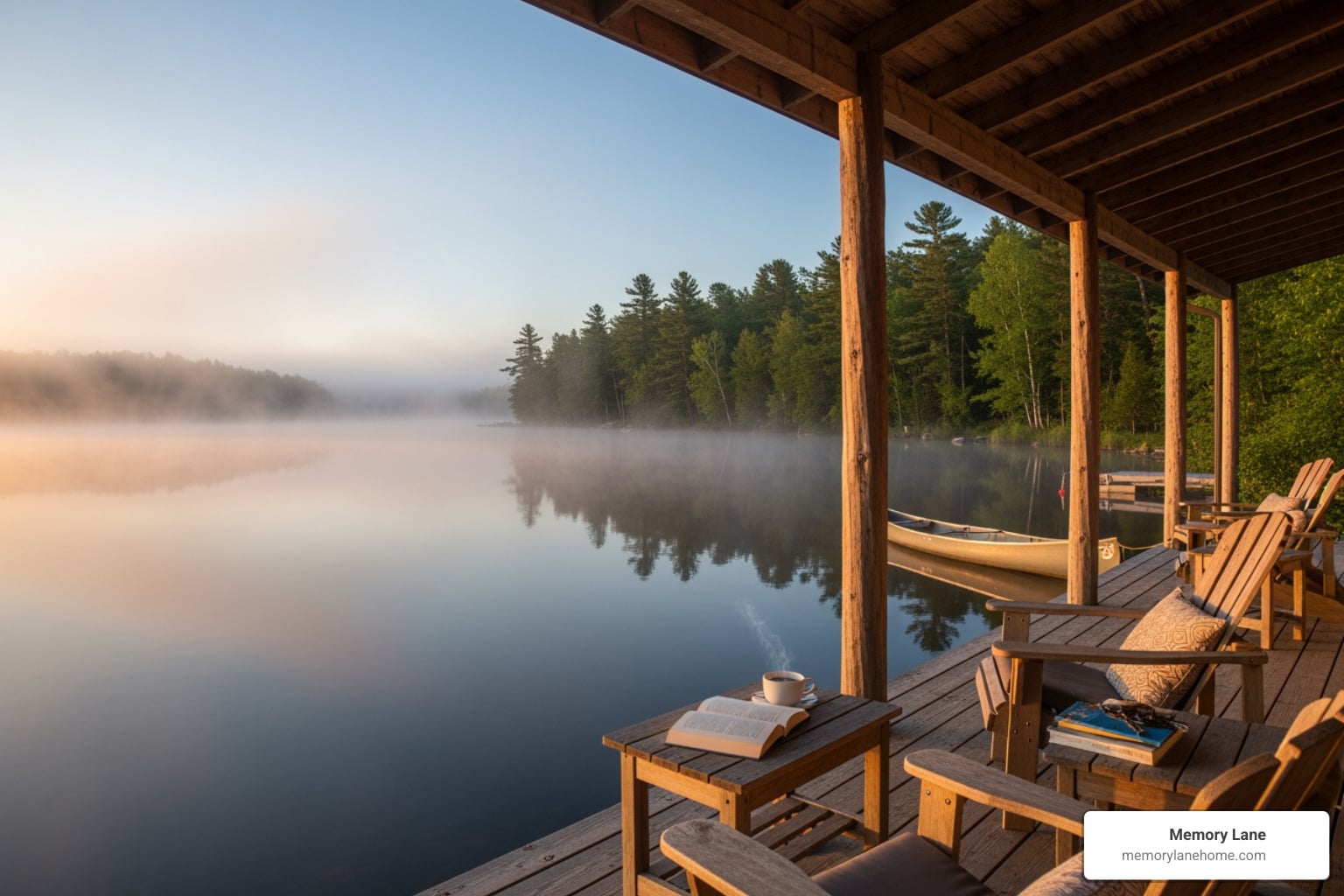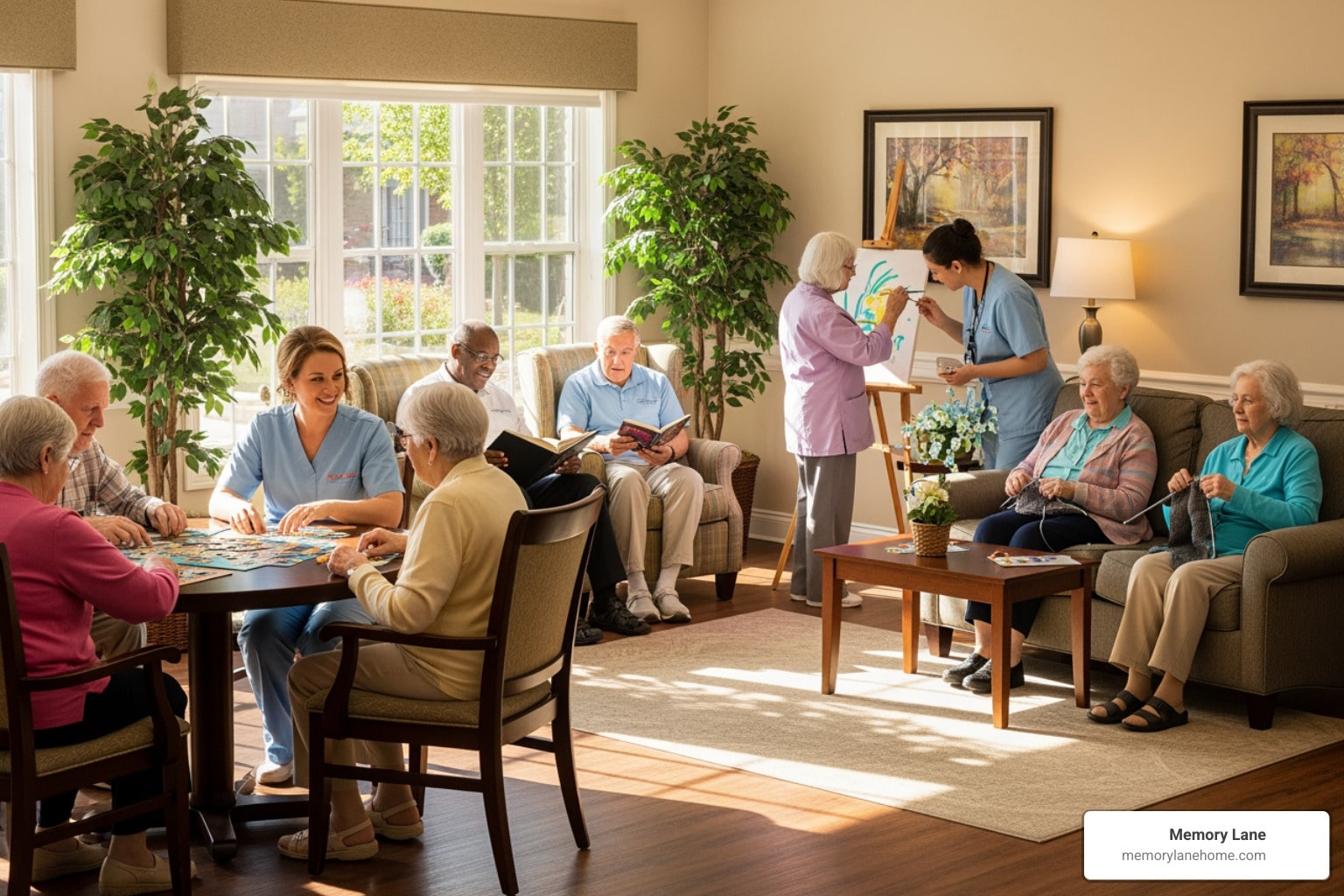Your guide to assisted living Michigan: explore costs, services, financial aid, and top communities for senior care.

Comprehensive Guide to Memory Care Facilities Near Me
Comprehensive Guide to Memory Care Facilities Near Me

Dementia Care Insights: Exploring Local Memory Support Programs and Memory Care Facilities in Ann Arbor
Memory care facilities near me demand compassionate expertise and tailored support to uphold dignity and cognitive health. Families in Ann Arbor and Ypsilanti face complex decisions when seeking specialized dementia care services that combine safety, social engagement, and clinical oversight. This article maps core insights across specialized dementia care, cost transparency, facility selection, family resources, program offerings, and local benefits—anchoring each theme in practical guidance and the unique approach of Memory Lane Assisted Living.
You will discover:
- How specialized memory care differs from assisted living frameworks.
- The spectrum of dementia types and localized support programs.
- Transparent Michigan pricing models and financial aid pathways.
- Criteria for choosing the best memory care environment.
- Essential family support networks and caregiver strategies.
- Signature Memory Lane activities and staff training protocols.
- Community advantages within Washtenaw County.
By weaving informational depth with real-world applications, this guide empowers families and professionals to navigate personalized memory support decisions with clarity and confidence.
What Is Specialized Dementia Care and How Does It Differs from Assisted Living?
Specialized dementia care integrates clinical protocols, cognitive stimulation, and environmental safety to address progressive memory loss and behavioral changes, enhancing quality of life through structured support. Unlike standard assisted living, which emphasizes independence and social amenities for seniors with general needs, dementia care services focus on 24/7 supervision, secure design features, and staff trained in neurocognitive symptom management. For families searching “memory care facilities near me,” understanding these distinctions ensures optimal placement and peace of mind.
Facilities offering specialized memory support typically include:
- Secure entry systems and monitored wandering prevention.
- Customized daily routines aligned with cognitive abilities.
- Therapeutic activities targeting memory retention and social engagement.
- Care plans adaptable to disease progression and behavioral fluctuations.
These key differences establish why individuals with Alzheimer’s disease or Lewy Body dementia require environments that prioritize cognitive safety and emotional reassurance, leading naturally into the core features that define memory care services.
What Are the Key Features of Memory Care Services?
Memory care services center on safe environments, personalized routines, and evidence-based therapies that sustain cognitive function and emotional well-being.
- Staff trained in dementia-specific communication and behavior strategies.
- Secure indoor/outdoor areas to prevent wandering and ensure supervised mobility.
- Structured social, recreational, and sensory activities promoting memory recall.
An introductory list clarifies the essential elements a family should seek. These features collectively foster independence within a protected setting and pave the way to understanding how assisted living integrates memory care support.
How Does Assisted Living with Memory Care Support Seniors with Dementia?
Assisted living with memory care blends residential independence with targeted clinical oversight, ensuring residents benefit from communal dining, housekeeping, and personalized care within a secure unit. Caregivers deliver medication management, gentle redirection techniques, and adaptive therapies that align with each resident’s cognitive stage. This integrated model reduces hospitalizations and eases transitions as dementia advances, illustrating how a combined approach sustains continuity of care while preserving dignity and social connection.
Why Is a Home-Like Environment Important in Dementia Care?
Creating a familiar, home-like atmosphere reduces anxiety and confusion by leveraging recognizable décor, personal mementos, and consistent routines that anchor memory. Design elements—such as six-bedroom ranch-style houses—encourage social bonds and ease orientation, while communal living rooms and private suites strike a balance between interaction and personal space.
This environment primes residents for therapeutic activities and support, seamlessly leading into the range of dementia types addressed locally.
Which Types of Dementia Does Memory Lane Support in Ypsilanti and Ann Arbor?
Memory Lane Assisted Living provides comprehensive programs for diverse neurocognitive conditions, defining each as a distinct clinical entity with tailored interventions. Families benefit from clear pathways designed around the unique progression and symptoms of each dementia type, ensuring specialized attention and evidence-based care strategies.
This table underscores Memory Lane’s capacity to address specific neurodegenerative profiles before exploring individual program details.
What Is Alzheimer’s Care and How Is It Provided Locally?
Alzheimer’s care focuses on preserving remaining cognitive abilities through memory cueing, spaced retrieval exercises, and multisensory stimulation, supporting brain health and emotional stability. Locally, Memory Lane Assisted Living implements personalized care plans featuring frequent orientation sessions, habit-reinforcing schedules, and familiar object memory boxes. This approach reduces agitation and promotes a sense of accomplishment, illustrating the direct link between tailored interventions and improved day-to-day engagement.
How Does Memory Lane Support Lewy Body Dementia Patients?
Lewy Body dementia programs emphasize safety, sensory simplicity, and motor support to address both cognitive fluctuations and movement challenges. Caregivers employ low-stimulus environments with high-contrast visual cues, guided movement therapies, and straightforward communication strategies. These targeted methods stabilize daily functioning and reduce distress linked to hallucinations and rigidity, highlighting the importance of condition-specific expertise.
What Are Frontotemporal Dementia Programs Offered?
Frontotemporal dementia interventions concentrate on behavioral regulation and language preservation through consistent routines, simplified communication prompts, and expressive art therapies. Memory Lane’s staff integrate structured social circles and narrative-based activities that honor personal history while mitigating impulsive behaviors. This focused support upholds social ties and clarity of expression, forming a blueprint for other dementia care models.
How Are Other Dementia Types Like Vascular and Parkinson’s Dementia Managed?
Management of vascular and Parkinson’s dementia combines cardiovascular risk monitoring, physical rehabilitation, and adaptive daily living assistance. Memory Lane integrates heart-healthy meal plans, walking groups, and specialized movement sessions to address motor decline, alongside cognitive exercises to sustain executive function. Combining physical and cognitive therapies enhances mobility and mental acuity in these mixed-etiology conditions.
How Much Does Memory Care Cost in Michigan and What Does All-Inclusive Pricing Include?
Transparent pricing demystifies memory care budgets by bundling housing, care, meals, and amenities into one predictable monthly fee. Memory care costs in Michigan vary by region and service level, but all-inclusive models simplify financial planning and prevent surprise fees as cognitive needs evolve.
This breakdown clarifies bundle components before detailing cost figures and assistance avenues.
What Are the Average Memory Care Costs in Ann Arbor and Ypsilanti?
Average memory care rates in Washtenaw County range from approximately $4,000 to $5,400 per month, reflecting service intensity and location. Memory Lane’s transparent all-inclusive pricing begins at $4,000 per month for a regular room and $4,500 per month for a master suite, encompassing care, meals, activities, and toiletries without hidden increases.
What Services Are Covered in Memory Lane’s Transparent Pricing Model?
Memory Lane’s pricing covers housing, three meals daily, comprehensive dementia care, tailored activities, hygiene supplies, and routine housekeeping. This model ensures that cognitive support intensifies as needs progress—without incremental fees—promoting financial stability for families.
What Financial Assistance Options Are Available for Dementia Care in Michigan?
Financial assistance pathways include state-funded MI Choice Waiver programs, veterans benefits, long-term care insurance, and Medicaid planning. Families can explore eligibility for supplemental aid to offset out-of-pocket expenses, easing the economic impact of specialized memory care.
How Do You Choose the Best Memory Care Facility for Your Loved One?
Selecting the right memory care environment hinges on clinical expertise, safety features, social engagement opportunities, and transparent communication with families. Evaluating these criteria ensures that residents receive individualized attention and appropriate therapeutic support.
Key selection steps include:
- Assess caregiver training and certification in dementia specialties.
- Verify secure design elements and wandering prevention systems.
- Review staff-to-resident ratios and personalized care plan processes.
- Observe resident engagement in structured activities and social events.
These considerations guide families toward high-quality programs before examining specific Memory Lane advantages.
What Factors Should Families Consider When Selecting Memory Care?
Families should evaluate facility safety features, care plan customization, staff expertise levels, social programming, cost transparency, and proximity to support networks. Prioritizing these factors fosters informed decisions and long-term satisfaction.
How Does Memory Lane’s High Caregiver-to-Resident Ratio Improve Care Quality?
Memory Lane’s high caregiver-to-resident ratio ensures individualized attention, rapid response to behavioral changes, and meaningful relationships between staff and residents. This ratio underpins consistent monitoring, personalized engagement, and reduced agitation episodes, reinforcing resident comfort and family trust.
What Are the Benefits of Local Memory Care Facilities in Ann Arbor and Ypsilanti?
Local facilities offer community integration, ease of family visitation, and established connections with area healthcare providers and support groups. Proximity enhances continuity of routines and strengthens social ties, promoting emotional stability for residents.
How Can You Schedule a Tour or Consultation at Memory Lane?
To explore Memory Lane’s homes and care philosophy, families may contact the administrative office by phone to arrange a personalized tour or in-depth consultation with memory care specialists. Visiting in person provides firsthand insight into daily life and staff-resident interactions.
What Family Support Resources and Caregiver Tips Are Available for Dementia Care?
Comprehensive caregiver support combines local group networks, practical management strategies, and facility-led involvement programs to sustain family well-being and resilience.
Before presenting resources, consider the value of peer connection and expert guidance in reducing caregiver burden.
Research indicates that specialized training programs can significantly enhance caregivers’ knowledge of memory and communication strategies, reduce their burden, and improve their perceptions of caregiving.
Dementia Caregiver Training: Enhancing Memory and Communication Support
A DVD-based training program was developed using research-based strategies for memory and communication in dementia. The effectiveness of the training on the caregiver experience and the well-being of the person with dementia was evaluated. Methods: A pre-test/post-test controlled trial was undertaken with caregiver–care-recipient dyads living in the community. Measures of the carers’ knowledge of memory and communication strategies, burden, positive perceptions of caregiving, and perceptions of problem behaviors were taken pre- and three months post-intervention. The depression and well-being of the person with dementia were also evaluated. Satisfaction with the training and feedback were measured.
Evaluation of a caregiver education program to support memory and communication in dementia: A controlled pretest–posttest study with nursing home staff, AJ Angwin, 2011
Which Local Dementia Support Groups Are Active in Ann Arbor and Ypsilanti?
Local support groups—facilitated by Alzheimer’s Association chapters and community centers—offer monthly meetings, educational workshops, and peer mentorship, fostering understanding and shared coping strategies.
What Practical Tips Help Caregivers Manage Dementia Challenges?
Effective tips include maintaining consistent daily routines, using simple visual cues, practicing calm redirection techniques, scheduling regular respite breaks, and engaging in memory therapy activities. These strategies improve communication and reduce stress for both caregivers and individuals with dementia.
Formal dementia care training for professionals, such as nurse care managers, has been shown to improve their ability to address crucial aspects of caregiver well-being and connect families with community resources.
Dementia Care Training for Nurse Managers: Improving Family Caregiver Support
Nurse care managers (NCM) operate through care management programs to provide care for persons living with dementia (PLWD) and interact regularly with their family caregivers; however, most do not receive formal instruction in dementia care or caregiver support. CRESCENT (CaReEcoSystem primary Care Embedded demeNtia Treatment) is a telephone-based dementia care intervention adapted from the Care EcoSystem model designed to equip NCMs with these tools. For this study, we aimed to measure intervention fidelity and understand how dementia care training impacted NCMs’ provision of dementia care management services during interactions with caregivers of PLWD. Trained NCMs were more likely to document addressing aspects of caregiver wellbeing (p= 0.03), community resources (p= 0.002), and identification of behavior (p= 0.03) and safety issues (p= 0.02) compared to those without training.
Impact of dementia care training on nurse care managers’ interactions with family caregivers, TJ Mellinger, 2023
How Does Memory Lane Facilitate Family Involvement and Support?
Memory Lane hosts quarterly family get-togethers, educational seminars led by dementia specialists, and open-house events, encouraging hands-on participation and transparent care updates. These initiatives strengthen family bonds and reinforce collaborative care planning.
What Specialized Programs and Activities Does Memory Lane Offer to Enhance Resident Well-Being?
Tailored programs target cognitive preservation, physical mobility, and social connection, leveraging personalized activities to bolster resident engagement and mental resilience.
How Do Tailored Activities Support Cognitive Health in Dementia Care?
Custom activity plans—such as music reminiscence, guided art sessions, and sensory gardens—stimulate neural pathways and foster positive emotions. By aligning tasks with individual interests and abilities, these activities promote sustained involvement and cognitive exercise.
What Is the Role of Family Get-Togethers and Social Events?
Regular family events and community celebrations integrate residents’ histories into shared experiences, reinforcing identity, social bonds, and emotional well-being. These gatherings nurture intergenerational connections and emotional support networks.
How Are Caregivers Trained to Manage Challenging Dementia Symptoms?
Caregivers undergo specialized certification in dementia care practices, including behavioral de-escalation, validation therapy, and personalized communication techniques. Ongoing workshops ensure proficiency in emerging care methodologies and best practices.
The significant global prevalence of dementia care highlights the profound impact it has on the mental health of both carers and individuals with dementia, underscoring the need for effective intervention strategies.
Dementia Care’s Impact on Mental Health: A Review for Carers
In this article we review how dementia care affects the mental health of the carer and the person with dementia. The number of people providing care to relatives with dementia is growing. 8·9 million people care for people with dementia worldwide.
Dementia care: mental health effects, intervention strategies, and clinical implications, S Sörensen, 2006
What Are the Benefits of Choosing Local Memory Support Programs in Washtenaw County?
Opting for memory care within Washtenaw County maximizes family proximity, leverages local health system partnerships, and taps into regional support infrastructures—enhancing continuity of care and community engagement.
How Does Proximity to Family Improve Dementia Care Outcomes?
Close distances enable frequent visits, seamless transitions during health changes, and real-time participation in care planning. Family involvement sustains emotional reassurance and personalized insights into resident preferences.
What Community Resources Complement Memory Lane’s Care Services?
Collaborations with adult day centers, local occupational therapists, and senior wellness programs expand therapeutic options and holistic support for residents, enriching the continuum of care beyond facility walls.
How Does Memory Lane Collaborate with Healthcare Providers and Support Organizations?
Memory Lane partners with area hospitals, geriatric specialists, and Alzheimer’s Association affiliates to coordinate medical oversight, streamline referrals, and host educational initiatives—ensuring integrated, expert-driven care.
Dementia care requires informed decisions, compassionate environments, and community collaboration. By evaluating specialized services, transparent pricing, caregiver support networks, and local advantages, families can select a memory care solution that fosters safety, engagement, and dignity for their loved ones.
Frequently Asked Questions
What Should Families Look for in a Memory Care Facility?
When selecting a memory care facility, families should prioritize safety features, staff qualifications, and the availability of personalized care plans. It’s essential to assess the facility’s environment, including secure areas to prevent wandering and the overall atmosphere that promotes comfort. Additionally, families should inquire about the types of activities offered, staff-to-resident ratios, and how the facility engages residents socially. Visiting the facility and observing interactions between staff and residents can provide valuable insights into the quality of care provided.
How Can Families Stay Involved in Their Loved One’s Care?
Families can remain actively involved in their loved one’s care by participating in care planning meetings, attending family events hosted by the facility, and maintaining regular communication with caregivers. Engaging in activities with residents, such as joining in on social events or therapeutic programs, can strengthen bonds and provide emotional support. Additionally, families should advocate for their loved one’s preferences and needs, ensuring that care remains personalized and aligned with their values and history.
What Are the Signs That a Memory Care Facility Is Right for Your Loved One?
Signs that a memory care facility is suitable for your loved one include a welcoming atmosphere, attentive staff, and a clear focus on individualized care. Look for facilities that offer structured activities tailored to residents’ cognitive abilities and interests. Positive interactions between staff and residents, as well as testimonials from other families, can also indicate a supportive environment. Additionally, a facility that encourages family involvement and provides transparent communication about care plans is likely to be a good fit.
What Role Do Community Resources Play in Dementia Care?
Community resources play a vital role in enhancing dementia care by providing additional support and services that complement those offered by memory care facilities. Local organizations may offer adult day programs, respite care, and educational workshops for families. Collaborations with healthcare providers, occupational therapists, and support groups can also facilitate comprehensive care. Access to these resources helps ensure that residents receive holistic support, addressing both their medical and emotional needs while fostering community connections.
How Can Caregivers Manage Stress While Caring for Someone with Dementia?
Caregivers can manage stress by establishing a consistent routine, seeking support from local caregiver groups, and taking regular breaks to recharge. Engaging in self-care activities, such as exercise, hobbies, or relaxation techniques, can also help alleviate stress. It’s important for caregivers to communicate openly with family members and professionals about their challenges and seek assistance when needed. Utilizing community resources and respite care services can provide much-needed relief and support for caregivers navigating the complexities of dementia care.
What Are the Benefits of Specialized Training for Caregivers in Memory Care?
Specialized training for caregivers in memory care equips them with essential skills to effectively manage the unique challenges associated with dementia. This training often includes techniques for communication, behavioral management, and understanding the progression of various dementia types. Well-trained caregivers can provide more personalized and compassionate care, leading to improved outcomes for residents. Additionally, ongoing education helps caregivers stay updated on best practices and emerging therapies, enhancing the overall quality of care provided in memory support settings.
Conclusion
Choosing the right memory care facility in Ann Arbor ensures that your loved ones receive compassionate, specialized support tailored to their unique needs. With transparent pricing and a focus on community integration, families can feel confident in their decision-making process. Explore the various programs and resources available at Memory Lane Assisted Living to enhance the quality of life for those living with dementia. Contact us today to schedule a tour and discover how we can support your family’s journey.


